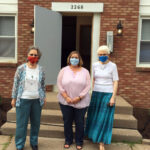On Feb. 1 Iowans have the privilege of exercising their vote in the first-in-the nation caucus. Pundits debate whether Iowa deserves this opportunity because its citizenry is not as diverse as the citizenry of other states. Furthermore, many Iowans don’t show up for this quadrennial event that helps winnow the field of presidential candidates. Forget the pundits. Focus on what matters: taking a stand for the presidential candidate you believe will act on the basis of the four principles of Catholic social doctrine: the dignity of the human person, the common good, subsidiarity and solidarity. The Catholic Church believes these core principles help faithful citizens to evaluate candidates’ promises in light of the Gospel and moral and social teaching. That, in turn, helps build a better world.
As a guide to your discernment process, read the U.S. Conference of Catholic Bishops’ updated document titled “Forming Consciences for Faithful Citizenship.” You can find it on the USCCB website: http://tinyurl.com/9pjns2r. The document doesn’t tell you who to vote for or how to vote. It provides guidelines based on church teachings. As the bishops state: “We recognize that the responsibility to make choices in political life rests with each individual in light of a properly formed conscience, and that participation goes well beyond casting a vote in a particular election.”
OK, so you’ve decided to participate in the Iowa Caucus. Whether it’s your first time or 10th time, we think it’s helpful to provide a brief primer on this quadrennial political event. First, you must be registered as a Republican or a Democrat to participate. If you have no party affiliation, register with one of the parties for caucus night. Each party has its own caucus site, with a total of nearly 2,000 statewide. To locate your caucus site, contact the Iowa Secretary of State’s office or visit the website http://2016iowacaucus.com. The caucuses, described as local party precinct meetings, begin at 7 p.m. in churches, schools and other local venues. You’ll discuss and then vote for the candidate of your party’s choice and elect delegates to your county’s convention. Procedures differ between Republican and Democrat caucuses. Republicans choose their party’s candidate by secret ballot. Democrats separate into groups supporting a particular candidate. Supporters can make a pitch for their candidate. To remain viable, the candidate must have the support of a certain percentage of the caucus participants (a figure based on the number of delegates assigned to the precinct). If not, the candidate’s supporters join a group with a viable candidate. Delegates selected at the caucus go on later to the county convention which in turn selects delegates to the congressional district state convention and then to the national convention.
A retired University of Northern Iowa professor criticized the Iowa caucus in the Jan. 24 issue of the Quad-City
Times for several reasons, one being that it’s a “closed caucus.” Independents with no party affiliation must declare themselves as Democrats or Republicans to participate in the caucus. Professor Emeritus Steven Corbin, the retired professor, makes a good point; there’s always room for improvement. We, however, believe this grassroots process provides an important exercise in responsible citizenship. Our church teaches that participation in political life is a moral obligation. Pope Francis set an example for us last fall in his historic address to the U.S. Congress.
Syrian suffering
While debate rages about how to deal with Syrian refugees fleeing their homes, there is a group that demands our urgent attention: Syrians living in Syria. Many are malnourished and facing starvation, trapped by sieges caused by their government and opposition forces battling for control of territory. As we reflect on how to observe this Year of Mercy, let’s spend some time discussing how to engage in corporal and spiritual works of mercy on behalf of the Syrians. And pray that peace talks scheduled for next week in Geneva, Switzerland, will take place and bring relief to these suffering Syrians.
Barb Arland-Fye, Editor











